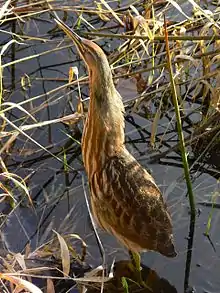Botaurus
Botaurus is a genus of bitterns, a group of wading bird in the heron family Ardeidae. The genus name Botaurus was given by the English naturalist James Francis Stephens, and is derived from Medieval Latin butaurus, "bittern", itself constructed from the Middle English name for the Eurasian Bittern, Botor.[1] Pliny gave a fanciful derivation from Bos (ox) and taurus (bull), because the bittern's call resembles the bellowing of a bull.[2]
| Botaurus | |
|---|---|
 | |
| American bittern (Botaurus lentiginosus) | |
| Scientific classification | |
| Kingdom: | Animalia |
| Phylum: | Chordata |
| Class: | Aves |
| Order: | Pelecaniformes |
| Family: | Ardeidae |
| Subfamily: | Botaurinae |
| Genus: | Botaurus Stephens, 1819 |
| Species | |
|
B. lentiginosa | |
The genus has a single representative species in each of North, Central and South America, Eurasia, and Australasia. The two northern species are partially migratory, with many birds moving south to warmer areas in winter.
The four Botaurus bitterns are all large chunky, heavily streaked brown birds which breed in large reed beds. Almost uniquely for predatory birds, the female rears the young alone.[3] They are secretive and well-camouflaged, and despite their size they can be difficult to observe except for occasional flight views.
Like other bitterns, they eat fish, frogs, and similar aquatic life.
Species
- American bittern, Botaurus lentiginosus
- Eurasian bittern, Botaurus stellaris
- Pinnated bittern or South American bittern, Botaurus pinnatus
- Australasian bittern Botaurus poiciloptilus
- Botaurus hibbardi (fossil)
References
- Jobling, James A (2010). The Helm Dictionary of Scientific Bird Names. London: Christopher Helm. pp. 75, 365. ISBN 978-1-4081-2501-4.
- "Bittern (1)". Oxford English Dictionary. Oxford University Press. Retrieved 16 May 2016.(subscription required)
- Sibly, Richard M.; Christopher C. Witt; Natalie A. Wright; Chris Venditti; Walter Jetz; James H. Brown (2012). "Energetics, lifestyle, and reproduction in birds" (abstract). Proceedings of the National Academy of Sciences of the United States of America. 109 (27): 10937–10941. doi:10.1073/pnas.1206512109. PMC 3390878. PMID 22615391.
